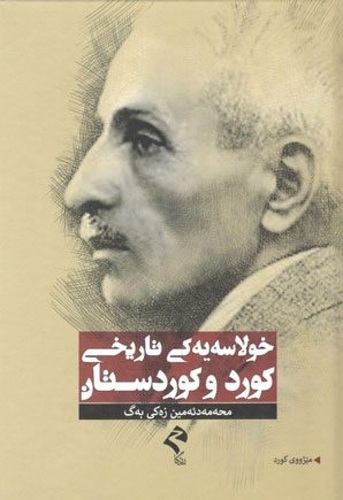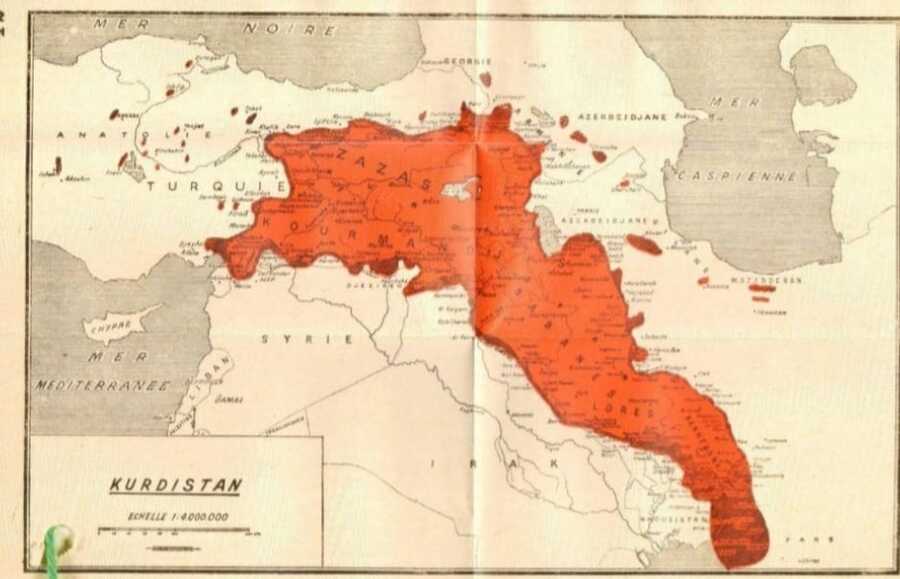Read the first part of this article here
What we mean by Kurdistan-oriented history writing is a type of recording the historical events that, unlike the previous traditions in writing history that would begin with praising the prophet or the kings, this type of history writing will consider Kurds and Kurdistan as the center of attention and focus showing the past form Kurdish people's lives, highlighting and emphasizing on the ancient history of Kurdistan and the Kurdish nation, thus, it will begin with pre-Islamic history in order to show how ancient the Kurdish nation is and where their roots and origins come from. Due to several reasons, Huzni was not successful in creating a dominant discourse in the field of nation-building, and due to the regional discourse, that was common among people, unfortunately, his works and efforts were marginalized even after that much effort he put into his work.
Six years after the publication of The Spring Blossom, Amin Zaki Bag, the former commander of the Ottoman army and later representative and member of the Kurdish Parliament in Baghdad, published the first Kurdistan-oriented history book in 1931. However, in that year and during Huzni's project, he published "The History of Famous Amirs and Rulers of Sharazour in Kurdistan" as the fourth volume of his history book.

Mohammad Amin Zaki Bag
We must not forget that Amin Zaki Bag has mentioned in his book's preface that he began to write this book in 1910 after he prepared the notes and collected the necessary information but since there was a fire incident in their neighborhood, all his notes were burned; later, after he saw a short passage by Minorsky in the Islamic pamphlet, he began to write his book again. "After I got hopeless after ten years, that is 1929, one day in the Navab Library, I saw the encyclopedia of Islam and in the second volume of this encyclopedia, I read a part that was particularly about Kurds written by an orientalist and the well-known writer, Von Minorsky. I read this part enthusiastically two or three times. This reading recreated a sense of eagerness to start writing Kurdish and Kurdistan's history once again". (Amin Zaki Bag, 1397: 37)
Amin Zaki Bag can be considered as one of the first generations of Kurdish historians in the Istanbul circle who under the influence of the Istanbul conditions and the changes in two concepts of Nation and Land had begun to write historical books. "After the application of the more common title of Ottoman, the title of Turks or Turani got more popular, like other people from other nations, my pride and honor became keener and it encouraged me to express my feelings at any opportunity. However, I did not know anything about my nation's origins and history because until that time we had never had the opportunity to study it in our schools or had the chance to see Kurdish historical books since the Ottoman society had deteriorated our ethnic sensibility more or less. I had always asked myself: to which nation do the Kurds belong? What did happen to them? However, I could not find a reasonable answer to these questions. Thus, I asked some great Kurdish scholars, two of whom were history professors; one of them said that Kurds come from Kurd son of Amro Haqqani which is indicated in a story by Moushash; and the other one made Kurdish people descendants of a Div (an evil creature) called Chasadiyan. These two wrong answers made me promise to search about this subject and solve this puzzle. The fact that I was staying in Istanbul was a good opportunity. I dedicated my free time to this research and I began in 1326 Romi by visiting Istanbul's library". (Zaki Bag, 1387: 36)

Mohammad Amin Zaki Bag had Ottoman tendencies in his political viewpoints and he even saw individual prospects in the Ottoman prospect and until this powerful state collapsed, although he knew there were ethnical differences between Kurds and Turks and his eagerness to discover his nation's history, he stayed with the Ottomans and even after it collapsed he went to Baghdad and instead of attempting to make an independent Kurdistan, he joined Baghdad and thus, he justified the reasons for Kurds defeat and their defected efforts in Kurds' independence in a hypocritic way: "Nobody can deny that among every nation, there is a sense of independence more or less which is a basic and natural right of every individual and nation, thus, no one must be accused for wanting such independence. Such a nation and especially its elites and scholars must make independence their goal and follow a logical and safe way to achieve it. They must not forget their knowledge and logic and they should not dedicate their time and lives unreasonably, they need to be calm and smart working together in peace and sincerely, and try to grow their social and political perspectives based on morality, science, and wealth. These are necessary in gaining independence and it is important to know that nowadays, independence will not survive with ignorance and poverty. Such independence will bring the people dictatorship and misery instead of wealth and prosperity which will end up dependent on foreigners once again. (Amin Zaki Bag, 1397, 208)

In addition to Mohammad Amin Zaki Bag's political viewpoint that seemed to be intended towards political realism or even individual prosperity, he was well aware of the importance of history and writing history books. That is why, even after his notes were burned, he did not give up the idea and began his work again. We cannot forget two main points here; first, he had to go back to his Kurdish ethnicity despite his former post and actions in the Ottoman army and his sympathy for his Turkish comrades during his military service in the Ottoman army, and second, the first thoughts of writing this history date back to 1931 and those years when Amin Zaki Bag lost all his hope for reformations in the newly established Iraqi government that he was one of the ministers and representatives in the Parliament of that government and later some fascist Arab authorities did not tolerate Amin Zaki Bag's role in that government thus, they began to challenge him. At this point, Amin Zaki Bag published two essays about his former efforts in 1831. That being so, we must look at Amin Zaki Bag's work from a perspective that shows his work was a reaction to the Arabic, and Turkish fascism and marginalizing Kurds that makes him go back to his national identity and his choice in writing down the history of Kurdistan.
…………………………………………………………
The writer of this preface has elaborately talked about Huzni in a book called The History of Kurdish Intellectualism, so, in this article, Huzni's work is not discussed in detail.








